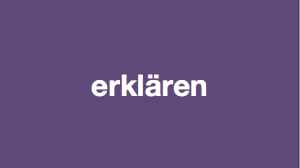German grammar in use: The conjugation of the verb “erklären” Posted by Sandra Rösner on Sep 25, 2014 in Grammar, Language
The common English translation for the German verb “erklären” is to explain. Further, it can mean to declare, to state, or to define — depending on context. Below you can find some example sentences with the German verb “erklären” and its conjugations.
Präsens – Present tense
| Singular | Plural | |
| 1st person | ich erkläre | wir erklären |
| 2nd person | du erklärst – informal Sie erklären – formal |
ihr erklärt – informal Sie erklären – formal |
| 3rd person | er/sie/es erklärt | sie erklären |
1. Wie erklären Sie sich ihren Erfolg?
(What do you attribute your success to?)
2. Der Student erklärt eidestattlich, dass er seine Hausarbeit selbstständig verfasst hat.
(The student declares under oath that he has written his term paper on his own.)
Imperativ – Imperative
| Singular | Plural | |
| 1st person | erklär | erklären wir |
| 2nd person | erkläre – informal erklären Sie – formal |
erklärt – informal erklären Sie – formal |
3. Bitte erkläre Sie uns, warum Sie ihre Aufgaben nicht erledigt haben
(May we have you explanation why you haven’t fulfilled your tasks?)
4. Erkläre mir, wie es soweit kommen konnte.
(Tell me, why it came to that.)
5. Erklären wir ihnen, warum wir nicht zur Party gehen wollen.
(Let’s tell me why we don’t want to go to the party.)
Präteritum – Preterit (equals simple past)
| Singular | Plural | |
| 1st person | ich erklärte | wir erklärten |
| 2nd person | du erklärtest – informal Sie erklärten – formal |
ihr erklärtet – informal Sie erklärten – formal |
| 3rd person | er/sie/es erklärte | sie erklärten |
6. Der Professor erklärte das Problem etwas näher.
(The professor explained the problem more fully.)
7. Der Richter erklärte den Angeklagten für schuldig.
(The judge convicted the defendant.)
Futur I – Future I
| Singular | Plural | |
| 1st person | ich werde erklären | wir werden erklären |
| 2nd person | du wirst erklären – informal Sie werden erklären – formal |
ihr werdet erklären – informal Sie werden erklären – formal |
| 3rd person | er/sie/es wird erklären | sie werden erklären |
8. Ich werde dir morgen meine Absichten erklären.
(I will declare my intention tomorrow.)
9. Sie werden sich bereit erklären, euch zu helfen. Da bin ich mir sicher.
(They will consent to help you. I’m sure about that.)
Perfekt – Perfect
| Singular | Plural | |
| 1st person | ich habe erklärt | wir haben erklärt |
| 2nd person | du hast erklärt – informal Sie haben erklärt – formal |
ihr habt erklärt – informal Sie haben erklärt – formal |
| 3rd person | er/sie/es hat erklärt | sie haben erklärt |
10. Ich habe das Umweltproblem anhand des CO2-Ausstoßes erklärt.
(I explained the environmental problem by taking the example of CO2 emission.)
11. Die Bank hat uns heute für bankrott erklärt.
(The bank has declared us bankrupt today.)
12. Der Richter hat den Angeklagten für nicht schuldig erklärt.
(The judge declared the defendant not guilty.)
Plusquamperfekt – Pluperfect (equals past perfect)
| Singular | Plural | |
| 1st person | ich hatte erklärt | wir hatten erklärt |
| 2nd person | du hattest erklärt – informal Sie hatten erklärt – formal |
ihr hattet erklärt – informal Sie hatten erklärt – formal |
| 3rd person | er/sie/es hatte erklärt | sie hatten erklärt |
13. Der Notarzt hatte den Verunglückten noch an Ort und Stelle für tot erklärt.
(The emergency doctor had pronounced the casualty dead on location.)
14. Das Gericht hatte das Urteil nach drei Jahren für nichtig erklärt.
(The court had recalled the sentence after three years.)
15. Meinen Eltern erklärten meinen Opa für wahnsinnig, als er ihnen von seinen Plänen, eine Weltreise zu machen, erzählte.
(My parents declared my grandpa insane when he told them about his plans to go on a world trip.)
Futur II – future II
| Singular | Plural | |
| 1st person | ich werde erklärt haben | wir werden erklärt haben |
| 2nd person | du wirst erklärt haben – informal Sie werden erklärt haben – formal |
ihr werdet erklärt haben – informal Sie werden erklärt haben – formal |
| 3rd person | er/sie/es wird erklärt haben | sie werden erklärt haben |
16. Bis heute Abend werden wir die Wahl für ungültig erklärt haben.
(We will quash the election by tonight.)

Build vocabulary, practice pronunciation, and more with Transparent Language Online. Available anytime, anywhere, on any device.
About the Author: Sandra Rösner
Hello everybody! I studied English and American Studies, Communication Science, and Political Science at the University of Greifswald. Since I have been learning English as a second language myself for almost 20 years now I know how difficult it is to learn a language other than your native one. Thus, I am always willing to keep my explanations about German grammar comprehensible and short. Further, I am inclined to encourage you to speak German in every situation. Regards, Sandra



